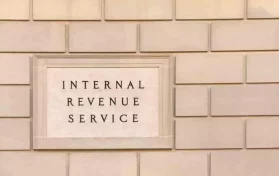
The IRS began accepting tax returns on January 24, 2022, but, a few weeks prior to that, IRS Commissioner Charles Rettig warned Americans that they should file electronically and file early in order to get a timely refund. Rettig also shared that unlike previous years, worker shortages and other issues related to the pandemic had the IRS facing a backlog of more than 10 million tax returns from 2020.
On Tuesday, however, Rettig took to the podium to discuss this backlog, which could present “enormous challenges” to the agency.
Rettig wrote an op-ed for Yahoo News discussing the overwhelming backlog. Rettig acknowledged the millions of unprocessed returns, which has resulted in a huge number of Americans waiting on their 2020 tax refund. However, Rettig also related the agency’s commitment to “return to normal inventory levels before next year.”
Rettig wrote about multiple methods the current IRS staff is working to meet these challenges. Rettig stated that the IRS required mandatory overtime for employees and the agency had created (and re-created) surge teams to address the great inventory of returns. Rettig added that the agency has modernized its operating systems in order to ramp up the processing of returns, and the agency has also suspended the sending of automated compliance notices.
So far, according to Rettig, the IRS has released $10 billion in tax refunds (about 4 million returns processed), the worker shortage at the IRS presents a huge challenge for the 2021 tax season. The worker shortage is only made more difficult when added complications in the forms of handling stimulus checks and changing tax policies related to the pandemic are factored in the equation. Many of the unprocessed returns are paper returns, which only adds to the challenges the agency faces.
Rettig acknowledged that taxpayers are calling to check on the process of their 2020 returns, only to be met with no answer. Those who have written to the IRS are also facing frustration; the agency says there are thousands of unanswered correspondence that has yet to be addressed due to worker shortages. Many of these worker shortages are in customer service. Since the pandemic, many employees have been unable to work for the last two years due to the pandemic and pandemic-related health issues.
Rettig wrote: “We want to do more, but we face great challenges.”
He added that the IRS is “grossly understaffed” and the budget is twenty percent less than it was just a decade ago. Adjusted for inflation, the Congressional Budget Office says that the $11.4 billion budget of the Internal Revenue Service is about twenty percent less than it was in 2010.
Rettig spoke directly about the funding issues at the IRS: “Without long term, predictable funding, the IRS will continue to face severe limitations, unable to provide the service taxpayers deserve and need.”
National Taxpayer Advocate Erin Collins reported to Congress that her office estimated that there were 8.6 million individual taxpayer returns to be processed as well as 2.8 million business returns that had yet to be addressed. In addition, the agency had approximately 5 million pieces of mail that sat unanswered.
Typically, the IRS begins a new tax season with only one million unprocessed returns in the normal backlog.
In addition to the backlog of correspondence and unprocessed returns, the IRS now has to reconcile monthly child tax credit payments as well as stimulus checks received on returns. Rettig warned taxpayers to “pay extra attention” to tax returns if they received Economic Stimulus payments or the monthly child tax credit. The IRS sent out letters to taxpayers regarding the amounts they were paid, numbering at least 150 million. Taxpayers will have to add the amount they received on tax returns.
Again, Rettig encouraged taxpayers to file soon, and to file electronically in order to receive a refund promptly. The tax season ends this year on April 18, reflecting Emancipation Day observances in Washington, D.C.





